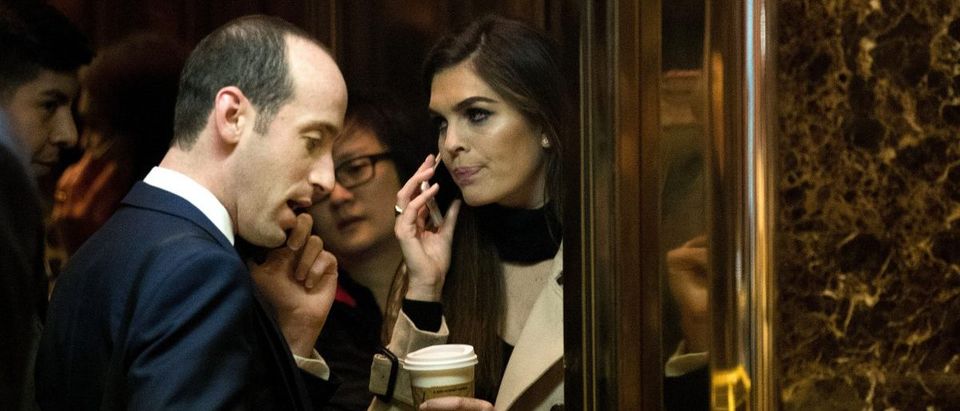The Supreme Court announced Monday that it will review lower court rulings blocking enforcement of President Donald Trump’s executive order on refugee and migrant entry, and stayed injunctions barring the order’s implementation.
The announcement is a major victory for the president, whose signature immigration policy has been stymied repeatedly by the federal courts.
The justices consolidated two travel ban cases from the 4th and 9th U.S. Circuit Courts of Appeals, and scheduled oral arguments for the first session of the Court’s next term, which begins in October. They also partially vacated several lower court injunctions barring enforcement of the order’s travel ban provision, which prohibits the entry of foreign nationals from six countries with high instances of terrorism for a 90-day period.
“We grant the government’s applications to stay the injunctions, to the extent the injunctions prevent enforcement of 2(c) with respect to foreign nationals who lack any bona fide relationship with a person or entity in the United States,” the Court wrote.
Two classes of foreign national from the six countries named in the order may still enter the United States; aliens with relatives in America, or individuals with a meaningful connection to corporate entities and educational institutions in the United States will not be affected by the order.
“To prevent the government from pursuing that objective by enforcing 2(c) against foreign nationals unconnected to the United States would appreciably injure its interests, without alleviating obvious hardship to anyone else,” the Court wrote.
The Court also will allow the order’s provisions concerning refugee resettlement to take effect, with the same exceptions it provided for the travel ban. The directive reduces the number of refugees the United States will accept from 110,000 to 50,000, and denies refugee entry for 120 days.
As such, most of the president’s order will take effect within the next few days.
Justice Clarence Thomas wrote an opinion concurring and dissenting in part with the Court’s decision, joined by Justices Samuel Alito and Neil Gorsuch. Thomas argued the stays should be issued in full, without exception. He writes:
I fear that the Court’s remedy will prove unworkable. Today’s compromise will burden executive officials with the task of deciding—on peril of contempt— whether individuals from the six affected nations who wish to enter the United States have a sufficient connection to a person or entity in this country. See ante, at 11– 12. The compromise also will invite a flood of litigation until this case is finally resolved on the merits, as parties and courts struggle to determine what exactly constitutes a “bona fide relationship,” who precisely has a “credible claim” to that relationship, and whether the claimed relationship was formed ‘simply to avoid §2(c)’ of [the] Executive Order.
The National Immigration Law Center, an immigrant advocacy group litigating against the order, vowed to continue their fight against the travel restrictions.
“Today’s unanimous Supreme Court decision is a clear victory for our national security,” the president said in a statement shortly after the ruling was issued. “It allows the travel suspension for the six terror-prone countries and the refugee suspension to become largely effective.”
“My number one responsibility as Commander in Chief is to keep the American people safe,” he added. “Today’s ruling allows me to use an important tool for protecting our Nation’s homeland. I am also particularly gratified that the Supreme Court’s decision was 9-0.”
It is not immediately clear that the ruling was unanimous. The Court issued its decision unsigned, and did not include a tally of the justice’s votes, as is typical of per curiam opinions. Five votes were needed to issue the stays, and four to review the lower court rulings. Given Thomas’ opinion dissenting as to the scope of the stay, it is safe to say there was a high degree of consensus — if Thomas, Alito, and Gorsuch supported a broader stay, then at least five of the other six justices supported the stay the Court tailored. However, one cannot definitively say it was unanimous.
Attorney General Jeff Sessions expressed confidence that the high court would ultimately uphold the legality of the president’s order.
“Through Article II of the Constitution, the founders of our country vested the Executive Branch with a great responsibility: to ensure the national security of our country,” he said. “I am committed to defending the President’s ability to exercise that responsibility and the Department of Justice is confident that the United States Supreme Court will uphold this constitutional and necessary executive order.”
Send tips to kevin@dailycallernewsfoundation.org.
All content created by the Daily Caller News Foundation, an independent and nonpartisan newswire service, is available without charge to any legitimate news publisher that can provide a large audience. All republished articles must include our logo, our reporter’s byline and their DCNF affiliation. For any questions about our guidelines or partnering with us, please contact licensing@dailycallernewsfoundation.org.


